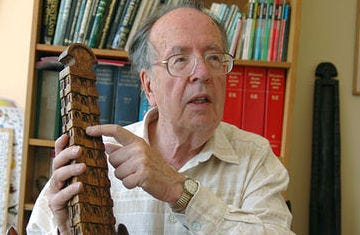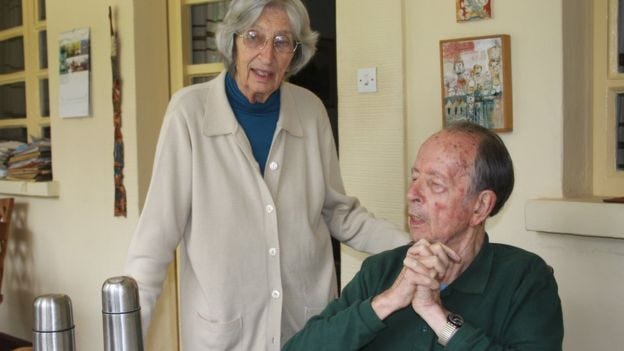Remembering Richard Pankhurst

Several Ethiopian websites are running the news that Richard Pankhurst has passed away.
For Ethiopians, I don’t have to outline here the incredible achievements Richard made to the study of their history. Any educated Ethiopian, whether in the country or in the Diaspora, knows very well what he did.
But for those aren’t Ethiopian or who have never heard him, he was a giant in a field he virtually created himself in collaboration with his wife, Rita. There was no “Ethiopian Studies” before Richard Pankhurst. Sure, there were books about Ethiopia, some brilliant, some frankly terrible, a few bizarrely racist. Richard’s books brought a new calibre of insight and depth to examining the country’s history and culture. He formalized Ethiopian History as an academic field and then became its greatest contributor.
Richard was the son of Sylvia Pankhurst, the famous suffragette, who took up the cause of Ethiopia when the Italians were waging their ruthless war on the country in the 1930s. In the Pankhurst home, he got the chance to meet some of the future luminaries of post-war Africa like Jomo Kenyatta and of black consciousness like Amy Garvey, ex-wife of Marcus Garvey. After World War Two, he went to visit Ethiopia with his mother and soon fell in love with the place.
You can learn more about Richard’s specific accomplishments here:
http://www.ayyaantuu.net/richard-pankhurst-passed/
But I really wanted to write a few words about what little I knew of the man personally. I didn’t know him well, but I would still call him a friend. The other great historian of Ethiopia, Ian Campbell, introduced me to Richard via email, and from the very beginning, Richard and Rita showed me the greatest kindness in helping my work on Prevail. Who was I? I was nobody! I don’t have a university degree, I don’t have professional credentials. But Richard, with a signature modesty, kindly pointed out that he himself originally had only a degree in Economics from the LSE (as if that were a minor achievement!).
He was clearly a gentle, patient man of strong ethics and quiet conviction. This is the Age of Shouting, of Noise, but Richard Pankhurst was from a politer generation, one that preferred to make its point quietly with evidence and facts and eloquent persuasion. There is a great little story from his and Rita’s memoir, Ethiopian Reminiscences, in which shortly after World War Two, some unapologetic fascists in London began agitating — even then! — to try to get Ethiopia back into Italy’s fold. Richard and his mother showed up, and they weren’t having it. Richard asked some very pointed questions, which irritated the fascists, and when he began passing out pamphlets on Italy’s war crimes, they ejected him from the meeting. But he made his point, and nothing more was ever heard again from that group of creeps.
Cut to decades later, and how even from a wheelchair, he was still fighting for the country’s heritage, protesting back in London and working with the campaign to return the Aksum Obelisk.

We corresponded for something like a year or so, and to have his stamp of approval in terms of his Foreword filled me with awe. This man knew Haile Selassie. This man had lived through the events I was writing about. He knew the subject better than I could ever hope to understand it. When I finally got to visit Ethiopia, I would end up in cabs, riding around Addis Ababa (when I couldn’t do any more marathon walks in the hot sun to save cash), and in idle conversation with drivers, I would end up talking about why I was here and mentioning the professor. “Richard Pankhurst!” people always softly exclaimed. They talked about him the way you’d talk about a rock star.
Then came the day when Ian Campbell kindly drove me out to see Richard and Rita. Richard’s voice was soft, practically a whisper. He had been suffering for some time, of course, from Parkinson’s Disease, but the great mind was still sharp, and he still answered my questions thoughtfully and like a master. It’s my deep regret that I never had the chance to go back and visit him.

He conversed with an Emperor and was friends with Afewerk Tekle. He could point to a famous family that had bravely struggled for women’s suffrage and human rights, but he carved out a destiny for himself of stunning accomplishments, while still carrying on crusades for issues held dear by those remarkable relatives.
I get the sense that all of Ethiopia is mourning today. But Richard will live on in his books. All you’d need do is walk into a well-stocked library or simply go on Amazon and check the titles. Look at how many books on a variety of subjects related to Ethiopia bear his name! What a legacy.
And it was my great privilege to have his words next to mine. It was a favour I can never repay, and for that, I try to honour him here.
� �դ�d
